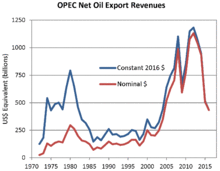
Petrodollar recycling is the international spending or investment of a country's revenues from petroleum exports ("petrodollars").[3] It generally refers to the phenomenon of major petroleum-exporting states, mainly the OPEC members plus Russia and Norway, earning more money from the export of crude oil than they could efficiently invest in their own economies.[4] The resulting global interdependencies and financial flows, from oil producers back to oil consumers, can reach a scale of hundreds of billions of U.S. dollars per year – including a wide range of transactions in a variety of currencies, some pegged to the U.S. dollar and some not. These flows are heavily influenced by government-level decisions regarding international investment and aid, with important consequences for both global finance and petroleum politics.[5] The phenomenon is most pronounced during periods when the price of oil is historically high.[6]
The term petrodollar was coined in the early 1970s during the oil crisis, and the first major petrodollar surge (1974–1981) resulted in more financial complications than the second (2005–2014).[7]
- ^ "OPEC Revenues Fact Sheet". U.S. Energy Information Administration. January 10, 2006. Archived from the original on January 7, 2008.
{{cite web}}: CS1 maint: unfit URL (link) - ^ Cite error: The named reference
EIA2015was invoked but never defined (see the help page). - ^ Myers, Amy; Elass, Jareer (January 2016). "War and the Oil Price Cycle". Journal of International Affairs. Archived from the original on April 10, 2019. Retrieved April 10, 2019.
- ^ Hertzberg, Hendrik (May 2, 2004). "In the soup - Bob Woodward's plan of attack". New Yorker. Retrieved April 10, 2019.
- ^ Coll, Steve (August 10, 2014). "Oil and erbil". New Yorker. Retrieved April 10, 2019.
- ^ Nsouli, Saleh M. (March 23, 2006). "Petrodollar Recycling and Global Imbalances". International Monetary Fund. Retrieved January 14, 2017.
- ^ Kinzer, Stephen (2008). All the Shah's Men: An American Coup and the Roots of Middle East Terror. Wiley. ISBN 978-0470185490.